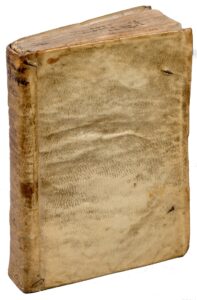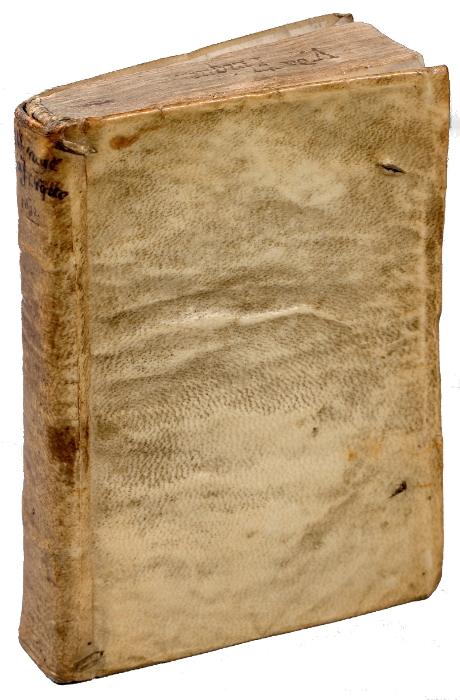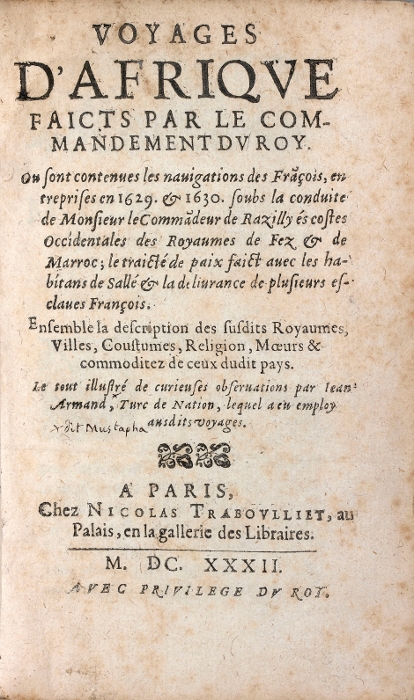Paris, Nicolas Traboulliet, 1632.
Small 8vo [161 x 102 mm] of (1) bl.l., (4) ll., 320 pp. and (1) bl.l. Bound in contemporary overlapped vellum, flat spine with beautifully handwritten title and date. Contemporary binding.
Rare first edition with a title renewed of the relation of the expeditions organized by Richelieu in 1629 and 1630 to the coasts of Morocco. This is one of the oldest French books about Morocco. Brunet, I, 483; Chadenat, 5008.
The privilege has been given on September 5th 1631 and few copies bear the date 1631. « Playfair in his «Bibliography of Morocco » says, concerning this book: ‘This work shows the great interest that Richelieu attached to the maritime preponderance of France and to commercial intercourse with Morocco’». (Chadenat, 5008)
Jean Armand, called Mustapha, born Turkish, came to France at the beginning of the 17th century to teach foreign languages. He became converted to the Christian religion by the Cardinal Richelieu. Richelieu creates a navy in 1626 appointing himself « Great Officer and Superintendant of the Navigation » and gives a great enlargement to the colonial settlements. The trade situation of French in Africa is extremely precarious at that moment. The corsairs from Salé captured many French ships and sailors and kept them in slavery. In 1629, Richelieu makes his cousin, the knight Isaac de Razilly, founder of the French colonial policy in Acadia, responsible for an expedition to Morocco. Razilly takes Jean Armand as an interpreter. The purpose of the 1629 and 1630 expeditions was the restoration of trade with the coasts of Fez and Morocco, and the negotiations for the repurchase of the French slaves. During the second expedition, the French blockaded in front of Salé until obtaining the peace and freedom for the French. The captives were finally released, the French dealers were allowed to trade freely and the Christians to practice their religion.
These are these expeditions from 1629 and 1630 that Jean Armand reports, making use of the reports and official documents, letters, treatises that Razilly and Richelieu entrusted him. This very interesting work contains peculiar details concerning the manners and the religion of the inhabitants of this land, and observations about geography; it also shows the great interest that Richelieu had in the trade with North Africa. The work is dedicated to Richelieu. In his foreword, the author pays homage to the Cardinal. The book contains the story of the expedition as well as a « brief and shorten treatise of the kingdoms of Fez and Morocco », made, he says, by « a Turkish who was an eyewitness of the events, who saw the country, but also used books ».
Bibliographers emphasize the extreme scarceness of this work. « First edition extremely rare of one of the oldest French works about Morocco. » (Chadenat) Brunet only quotes one copy, the Langlès’ copy. No copy is listed on the international market since the beginning of the reports 34 years ago.
A splendid wide-margined copy of this very rare travel relation, preserved in its contemporary overlapped vellum.
Provenance: autograph signature of Jean Juchereau de La Ferté, sieur de Maur (1592-1672) on the first pastedown. He was close to the New France governor, Isaac de Razilly. Once he arrived in Quebec in 1634, he became later general clerk of the shops of the New France. According to a handwritten note from the 19th century on the first blank leaf, the copy would come from the fine Le Camus de Limare’s collection, scattered in 1786.


